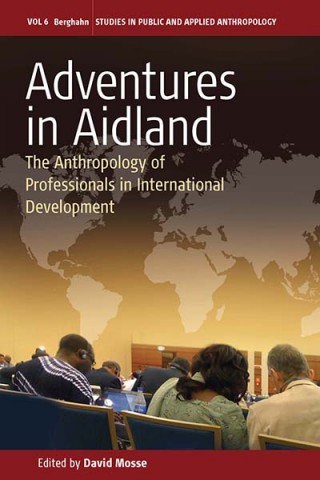Adventures in Aidland
Before picking up David Mosse's "Adventures in Aidland: The Anthropology of Professionals in International Development" (2011), I had read one chapter and had high expectations that it would be an interesting read. I felt the book was torn between two topics that made it less cohesive, and some chapters felt revised to suit a new topic but didn't do either justice in the process. As Mosse notes, many of these chapters originated from a conference panel on "Cosmopolitanism and Development" in 2006, which remained a key theme throughout. At the same time, the book claims to present works wherein "anthropologists write about expertise in the realm of international development" (p. vii). Nonetheless, I do suggest Chapters 3, 7 and 8 for development studies students (and teaching), and Chapter 10 for those interesting in a satirical Alice in Wonderland vision of Aidland (the origin of the book's title).
Chapter 3 is a contribution by Tania Murray Li on "Rendering Society Technical" and in some ways offers a shorter version of her longer works (e.g. The Will to Improve and Land's End) on the topic, making it somewhat more accessible for students. For example, she writes: "Central to government is the practice I call 'rendering technical', a shorthand for what is actually a set of practices concerned with representing 'the domain to be governed as an intelligible field with specifiable limits and particular characteristics'" (p. 57). Further: "Government through community requires that community be rendered technical. It must be 'investigated, mapped, classified, documented, interpreted' (1999: 175)". For those unfamiliar with Li's work, this chapter presents clear examples in a relatively short chapter.
The second recommended portion, Chapter 7, comes from another familiar name on this site: Rosalind Eyben (author of The Making of a Better World and co-editor of The Politics of Evidence). The chapter provides unique insight into donor agency staff experiences – as I mentioned previously Eyben herself made many of the choices being criticized (as also, generally, described by Robert Chambers in 1983). For a world few have lived in, and many wonder about, it is an excellent read. Eyben works to make a minor shift in the donor community within Bolivia to gain more firsthand experience as participant observers.
I also recommend Chapter 8, written by Rajak and Stirrat. It does encounter this two objective problem, resulting in a somewhat lost focus. Nonetheless, it offers some concise and clear summaries of international development and the odd disconnection between international and domestic activity. They describe the field trips development actors make as carefully orchestrated rituals, that development professionals "are of course aware of" and who also play this same ritualistic game for others. On development actors, he explains that even "in their interactions with the 'host community', development professionals tend to be restricted or restrict themselves to certain categories of 'locals'… In general there is relatively little social interaction between development professionals and the host population at the level of friendship" (p. 167-168).
On the cosmopolitan values part, an interesting comment: "Whilst there are some individuals who display an interest in attempts at developing a Buddhist framework for development or who try to develop an Islamic economics, these are few and far between. Furthermore, the flow of funding ensures a certain orthodoxy in the development world, and stepping too far outside the boundaries is to put this funding at risk. The ideas and practices of the development industry can be viewed as parochial in the extreme, involving a rejection of alternatives and an attempt to 'naturalize' and 'universalize' one particular strand of looking at the world" (p. 166).

